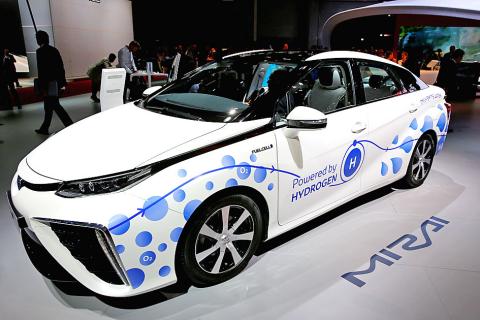Having invested heavily in hydrogen, a technology derided by Tesla Inc chief executive Elon Musk as “incredibly dumb,” Toyota Motor Corp is making a renewed push for fuel cell cars to fill a role in a future dominated by electric battery vehicles.
Japan’s biggest automaker believes both technologies — all-electric battery cars like the Tesla Model X on one hand and Toyota’s hydrogen Mirai on the other — will be needed to fully usurp gasoline cars.
“We don’t really see an adversary ‘zero-sum’ relationship between the EV [electric vehicle] and the hydrogen car,” Toyota chairman Takeshi Uchiyamada said ahead of the Tokyo Motor Show. “We’re not about to give up on hydrogen electric fuel-cell technology at all.”

Photo: Reuters
Toyota began pitching its fuel-cell car as a mainstream gasoline car alternative in 2014 when it launched the Mirai with a price tag of ¥7.24 million — almost US$70,000 at the time.
The car has since been launched in the US and other countries around the world, but initial excitement has faded as major markets including China and Europe have tilted heavily toward electric vehicles.
Just 4,300 Mirais have been sold, compared with about 4 million units of the Prius, Toyota’s blockbuster hybrid that ushered in the age of the EV.
Uchiyamada, who is known as the “father of the Prius,” says Toyota is not anti-EV and is investing heavily in technologies such all solid-state lithium-ion batteries to make them more desirable.
However, it also sees some advantages for hydrogen cars, which are propelled by electricity generated by fuel cells.
One major issue facing EVs is the length of time they take to charge — up to 18 hours in some cases — a problem being amplified as automakers pack in more batteries to extend range.
Rapid charging technology is helping to solve this issue.
However, a 30 to 40-minute wait is still too long for many ordinary drivers with busy lives, said Yoshikazu Tanaka, the chief engineer in charge of Toyota’s Mirai.
What is worse, rapid charging when used too often compromises battery life significantly, he and other engineers said.
While a hydrogen car can refuel in under five minutes, the high cost of the technology and a lack of refueling stations is a problem, something Toyota has been focused on addressing.
The company has joined forces in Japan with rivals Nissan Motor Co and Honda Motor Co, and with energy companies such as JXTG Nippon Oil & Energy to build a network of refueling stations that now totals 91.
Making the fuel-cell system more efficient and trying to gain more propulsion power from a given amount of hydrogen will be key, Tanaka said.
He also wants to package the vehicle more efficiently to gain more storage space for larger fuel tanks.
Toyota says one of the most promising markets for hydrogen cars is China — a key advocate of electric cars, but one that is also beginning to embrace fuel-cell technology.
Shanghai last month announced plans to promote development of fuel-cell vehicles by adding hydrogen refueling stations, subsidizing companies developing fuel-cell technologies, and setting up research and development facilities.
Toyota was set to test hydrogen fuel-cell cars in China this month to determine the feasibility of selling the Mirai there.

To many, Tatu City on the outskirts of Nairobi looks like a success. The first city entirely built by a private company to be operational in east Africa, with about 25,000 people living and working there, it accounts for about two-thirds of all foreign investment in Kenya. Its low-tax status has attracted more than 100 businesses including Heineken, coffee brand Dormans, and the biggest call-center and cold-chain transport firms in the region. However, to some local politicians, Tatu City has looked more like a target for extortion. A parade of governors have demanded land worth millions of dollars in exchange

An Indonesian animated movie is smashing regional box office records and could be set for wider success as it prepares to open beyond the Southeast Asian archipelago’s silver screens. Jumbo — a film based on the adventures of main character, Don, a large orphaned Indonesian boy facing bullying at school — last month became the highest-grossing Southeast Asian animated film, raking in more than US$8 million. Released at the end of March to coincide with the Eid holidays after the Islamic fasting month of Ramadan, the movie has hit 8 million ticket sales, the third-highest in Indonesian cinema history, Film

Taiwan Semiconductor Manufacturing Co’s (TSMC, 台積電) revenue jumped 48 percent last month, underscoring how electronics firms scrambled to acquire essential components before global tariffs took effect. The main chipmaker for Apple Inc and Nvidia Corp reported monthly sales of NT$349.6 billion (US$11.6 billion). That compares with the average analysts’ estimate for a 38 percent rise in second-quarter revenue. US President Donald Trump’s trade war is prompting economists to retool GDP forecasts worldwide, casting doubt over the outlook for everything from iPhone demand to computing and datacenter construction. However, TSMC — a barometer for global tech spending given its central role in the

Alchip Technologies Ltd (世芯), an application-specific integrated circuit (ASIC) designer specializing in server chips, expects revenue to decline this year due to sagging demand for 5-nanometer artificial intelligence (AI) chips from a North America-based major customer, a company executive said yesterday. That would be the first contraction in revenue for Alchip as it has been enjoying strong revenue growth over the past few years, benefiting from cloud-service providers’ moves to reduce dependence on Nvidia Corp’s expensive AI chips by building their own AI accelerator by outsourcing chip design. The 5-nanometer chip was supposed to be a new growth engine as the lifecycle